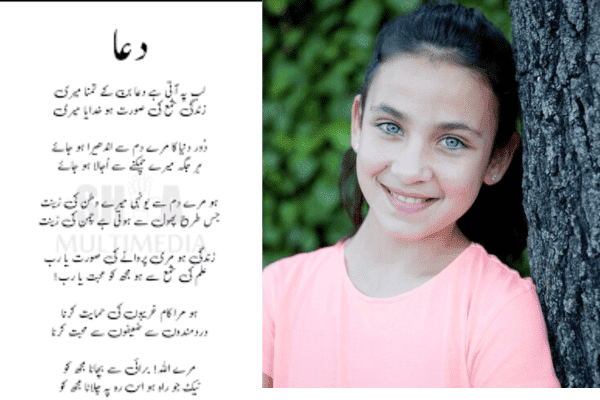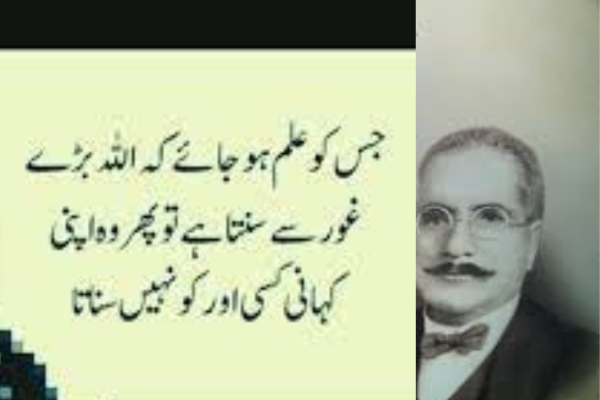Table of Contents




Allama Iqbal Often called the “Spiritual Father of Pakistan,” Allama Muhammad Iqbal is one of the most eminent poets and philosophers in Urdu language. Iqbal, who was born in Sialkot, Pakistan, in 1877, irenowned for his poetry, which calls on Muslims to experience self-realization and enlightenment as well as profound intellectual thinking and spiritual awakening. Millions of people all around the world are still motivated and inspired by his poetry. This article examines Allama Iqbal’s ten most well-known Urdu poems, which showcase his exceptional lyrical talent and deep insight.
Lab Pe Aati Hai Dua Ban Ke Tamanna Meri
لب پہ آتی ہے دعا بن کے تمنا میری
زندگی شمع کی صورت ہو خدایا میر
Allama Iqbal Often called the “Spiritual Father of Pakistan,” Allama Muhammad Iqbal is one of the most eminent poets and philosophers in Urdu language. Iqbal, who was born in Sialkot, Pakistan, in 1877, is renowned for his poetry, which calls on Muslims to experience self-realization and enlightenment as well as profound intellectual thinking and spiritual awakening. Millions of people all around the world are still motivated and inspired by his poetry. This article examines Allama Iqbal’s ten most well-known Urdu poems, which showcase his exceptional lyrical talent and deep insight.
prayer “Lab Pe Aati Hai Dua Ban Ke Tamanna Meri,” one of Iqbal’s most well-known poems, has been chanted in Pakistani classrooms for many years. The poem captures the naive need for insight, understanding, and unselfish devotion of a young kid. It embodies Iqbal’s belief that young people, driven by morality and compassion for all people, will design the future.
Khudi Ka Sirr-e-Nihan
.”
Iqbal’s book “Bang-e-Dra” has this potent poetry that highlights the idea of “Khudi” (selfhood or self-awareness). Iqbal fervently contends that a relationship with the Divine is the only path to authentic self-realization. The poems exhort readers to pursue self-empowerment and spiritual development.
3. Shikwa
“شکوہ اللہ سے، خاکم بدہن ہے مجھ کو کہ سلیم و خلیل، میر کارواں ہے مجھ کو”
Iqbal’s “Shikwa” (The Complaint) is among his most well-known and contentious poems. The poem, which is written in an assertive style, asks God directly why the Muslim Ummah is declining in spite of its faith and sacrifices. It captures the anguish and dissatisfaction of a believer looking to the Creator for guidance.
4. Jawab-e-Shikwa
“کمالِ عشق و مستی کی نہ اِس سے کوئی حد تھی عرب کے ریگ زاروں میں بنی فطرت کی مسند تھی”
“Jawab-e-Shikwa” refers to the reply to the complaint, which comes after “Shikwa.” In this instance, Iqbal assumes the role of God answering Muslim grievances. The poem offers a helpful critique, pointing out the areas in which Muslims have failed and urging them to go back to the principles of bravery, harmony, and faith.
5. Sare Jahan Se Achha
“سارے جہاں سے اچھا ہندوستاں ہمارا ہم بلبلیں ہیں اِس کی، یہ گُلستاں ہمارا”
“Tarana-e-Hindi,” or “Sare Jahan Se Achha,” is a patriotic poem that honours the diversity and beauty of the Indian subcontinent. Written in 1904, it celebrated the oneness of all Indians, regardless of religion or culture, and became an anthem for the country’s independence.
6. Tulu-e-Islam
“نکل کر خانقاہوں سے ادا کر رسمِ شبیری کہ فقرِ خانقاہی ہے فقط اندوہ و دلگیری”
Iqbal predicts the revival of the Muslim world in “Tulu-e-Islam” (The Rise of Islam). He urges Muslims to act, show courage, and go back to their spiritual origins in order to liberate themselves from the bonds of inaction and revitalise their faith. The poem serves as a forceful plea for an Islamic Renaissance.
7. Saqi Nama
فوئٌ بب ؆رخِ نٌيٌ فام سْ شبح ةٌ نمود�فوا شوقِ تماشا ةا تقاضا مبؾ ةو بؾ~�.”
In his metaphorical poetry “Saqi Nama” (The Book of the Cupbearer), Iqbal uses the concept of a cupbearer distributing wine to give Muslims a fresh lease on life. The cupbearer is a representation of a heavenly guide, while the wine stands for wisdom and spiritual enlightenment.
8. Bang-e-Dra
اُدٌ فو علم س\� م٭ةم تو أٌرتِ ببر،ي�ادر فو عشق س\� م٭ةم تو صًرِ اسرافٌل.”
The goal of the title poem in Iqbal’s book “Bang-e-Dra” (The Call of the Marching Bell) is to reawaken the Muslim community’s latent spirit. Iqbal issues a call to action, reminding them of their glorious history and urging them to rise above their current situation.
9. Teri Duniya Mein Jeene Se
تیری دنیا مόغ جόنϒ سϒ تو بρتر ρϒ کρ مر جائόں وρ خوش ρوں، ρم جدا ρوں، نρ ρم ρوں، نρ وρ وρ آئόں.” This depressing poem conveys Iqbal’s disillusionment with the world’s materialism and superficiality.
10. Musafir
مسافر مٌث ٽمغ مم ب؎ٌ، مسافر فو تم بؾٌ�ةسٌ موؑ َر ٽ؎ر ملاقات فودٌ.”
The contemplative poetry “Musafir” (The Traveller) explores the path of life. Iqbal compares the fleeting aspect of life and the never-ending search for truth and self-discovery to that of a traveller. It serves as a lovely reminder that everyone is on a journey, not a destination, and that everyone is searching for something more in life.
conclusion
The core of Allama Iqbal’s ideas on philosophy, religion, love, patriotism, and self-identity may be found in his poetry. His creative prowess and genuine concern for the social and spiritual awakening of the Muslim community are evident in each of the poems listed above. His ideas are still relevant today, serving as a constant reminder of the need of faith, self-realization, and the never-ending search for a greater good.
